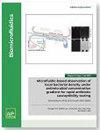Poly(lactic-co-glycolic acid) nanoparticle fabrication, functionalization, and biological considerations for drug delivery
IF 2.4
4区 工程技术
Q2 BIOCHEMICAL RESEARCH METHODS
引用次数: 0
Abstract
Nanoparticles can be used for drug delivery and consist of many sizes and chemical compositions. They can accommodate a diverse population of drugs and can be made to target specific areas of the body. Fabrication methods generally follow either top-down or bottom-up manufacturing techniques, which have differing production controls, which determine nanoparticle characteristics including but not limited to size and encapsulation efficiency. Functionalizing these nanoparticles is done to add drugs, prevent aggregation, add positive charge, add targeting, etc. As the nanoparticles reach the target cells, cellular uptake occurs, drug is released, and the nanoparticle is broken down. Poly(lactic-co-glycolic acid) (PLGA) nanoparticles have often been used for drug delivery applications as they have shown minimal toxicity, which has helped with US FDA approval. This review breaks down PLGA nanoparticle fabrication, functionalization, and biological considerations.聚(乳酸-共聚乙醇酸)纳米粒子的制备、功能化以及用于给药的生物学考虑因素
纳米颗粒可用于给药,由多种尺寸和化学成分组成。它们可容纳多种药物,并可针对人体的特定部位进行制造。制造方法通常采用自上而下或自下而上的制造技术,这两种技术具有不同的生产控制,决定了纳米粒子的特性,包括但不限于尺寸和封装效率。对这些纳米粒子进行功能化处理可添加药物、防止聚集、增加正电荷、增加靶向性等。当纳米颗粒到达靶细胞时,细胞会吸收,药物会释放,纳米颗粒会被分解。聚乳酸-共聚乙醇酸(PLGA)纳米粒子经常被用于给药应用,因为它们显示出最小的毒性,这有助于获得美国 FDA 的批准。本综述将对 PLGA 纳米粒子的制造、功能化和生物学考虑因素进行分析。
本文章由计算机程序翻译,如有差异,请以英文原文为准。
求助全文
约1分钟内获得全文
求助全文
来源期刊

Biomicrofluidics
生物-纳米科技
CiteScore
5.80
自引率
3.10%
发文量
68
审稿时长
1.3 months
期刊介绍:
Biomicrofluidics (BMF) is an online-only journal published by AIP Publishing to rapidly disseminate research in fundamental physicochemical mechanisms associated with microfluidic and nanofluidic phenomena. BMF also publishes research in unique microfluidic and nanofluidic techniques for diagnostic, medical, biological, pharmaceutical, environmental, and chemical applications.
BMF offers quick publication, multimedia capability, and worldwide circulation among academic, national, and industrial laboratories. With a primary focus on high-quality original research articles, BMF also organizes special sections that help explain and define specific challenges unique to the interdisciplinary field of biomicrofluidics.
Microfluidic and nanofluidic actuation (electrokinetics, acoustofluidics, optofluidics, capillary)
Liquid Biopsy (microRNA profiling, circulating tumor cell isolation, exosome isolation, circulating tumor DNA quantification)
Cell sorting, manipulation, and transfection (di/electrophoresis, magnetic beads, optical traps, electroporation)
Molecular Separation and Concentration (isotachophoresis, concentration polarization, di/electrophoresis, magnetic beads, nanoparticles)
Cell culture and analysis(single cell assays, stimuli response, stem cell transfection)
Genomic and proteomic analysis (rapid gene sequencing, DNA/protein/carbohydrate arrays)
Biosensors (immuno-assay, nucleic acid fluorescent assay, colorimetric assay, enzyme amplification, plasmonic and Raman nano-reporter, molecular beacon, FRET, aptamer, nanopore, optical fibers)
Biophysical transport and characterization (DNA, single protein, ion channel and membrane dynamics, cell motility and communication mechanisms, electrophysiology, patch clamping). Etc...
 求助内容:
求助内容: 应助结果提醒方式:
应助结果提醒方式:


